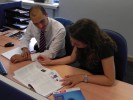 I have now been at the RSC for 11 months, so I’m already planning my anniversary bake (I’m sure the other blog posts have mentioned the importance of cake)!
I have now been at the RSC for 11 months, so I’m already planning my anniversary bake (I’m sure the other blog posts have mentioned the importance of cake)!
It has been an exciting time in publishing recently as summer means the release of impact factors! Journal impact factor results were promising for the RSC, and we recently had a celebration in which we were all rewarded for our work with ice cream (like I said, food is a major part of our lives). My team is currently working hard on our newest journal,
Nanoscale Horizons. As a new journal it does not have an impact factor yet, but we’re aiming high, and those of the team working on it are keen to pick top work and attract the best researchers.
Throughout the past year as a Publishing Editor, I’ve found the role gets more and more varied with time. I passed my peer review training a while back, and whilst I’m still in editing training, I’ve started to get more new responsibilities; I am office contact for
some Associate Editors, and a cover coordinator which gives me a say in the images and research featured on the journal covers. I also recently volunteered with the Membership team to recruit new members for the RSC. This is a project running until early next year that will provide Publishing Editors with experience representing the RSC in person. I will travel to various Universities around the UK for day visits approximately once a week as well as continuing with my Publishing Editor responsibilities.
I am really looking forward to being involved in this project, and to the new challenges in my day to day Publishing Editor activities!
Alex is a Publishing Editor working in the Physical & Nano team, in the Royal Society of Chemistry's Publishing Department. To see if there are any current vacancies go to 'RSC: Latest Vacancies' Blog or subscribe to 'RSC: Latest Vacancies' by Email
